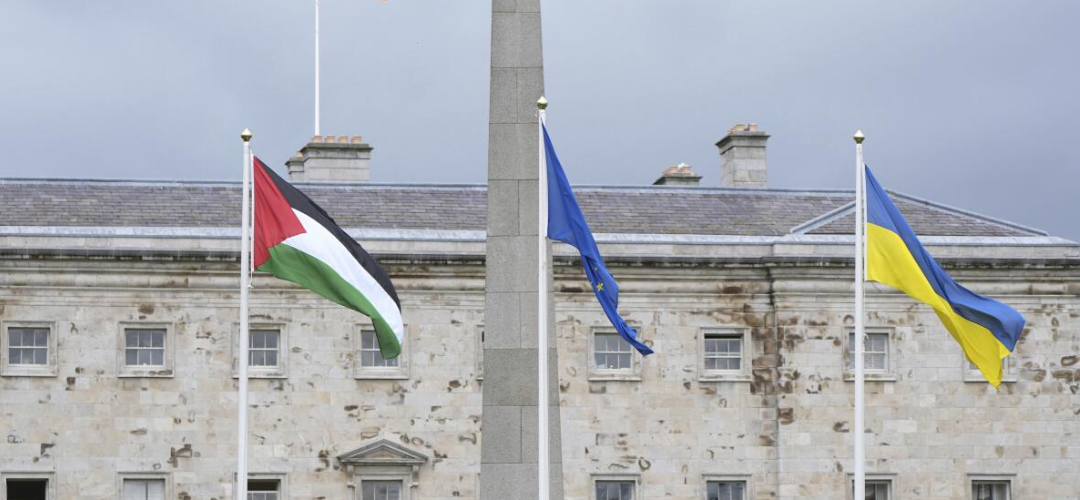As multiple European states recognise Palestine, Israel appears to be rapidly running out of friends in the powerful EU.
Norway, Ireland and Spain have formally recognised the state of Palestine, marking a significant step toward the Palestinian goal of statehood. The joint decision by these European countries could generate momentum towards recognising the Palestinian state by other European Union (EU) countries and, more worryingly for Tel Aviv, add to its global isolation.
The US has also denounced these moves as undermining the negotiation process. Israel responded by recalling its ambassadors to Ireland, Norway, and Spain and described the move as “a reward for terrorism”. Norway clarified recognising Palestine cannot be equated with supporting Hamas but is rather supporting authorities that arise out of the Palestine Liberation Organization (PLO) that will agree to work towards a peaceful settlement with Israel.
Background
Before the recent announcements by these three countries, seven members of the 27-nation EU bloc had officially recognised Palestine. Five of these seven countries are the former Eastern Bloc countries that announced their recognition of Palestine in 1988 when part of the Soviet Union. However, some of these countries have distanced themselves from this historic declaration since they became independent. Sweden recognised Palestine subsequently in 2014. So far, more than two-thirds of the United Nations (UN) members have recognised Palestine – around 140 countries. In 1988, India became one of the first countries to recognise the State of Palestine. In 1996, India opened its Representative Office to Palestine in Gaza City, which was later shifted to Ramallah in 2003.
The United States, Britain, and other Western countries have supported the idea of an independent Palestine adjacent to Israel as a way to resolve the unending conflict, but they precondition it on a negotiated settlement. However, since 2009, there have been no substantial negotiations towards this.
The U.S. still does not support unilateral recognition of Palestine outside of a negotiated result, sticking to its longstanding policy on the matter.

Analysis
Even though the European countries do not recognise an existing state but the idea of one, the gesture is significant. It helps improve the Palestinians’ international standing and also increases pressure on Israel to open negotiations towards a ceasefire.
While dozens of countries have recognised the state of Palestine, none of the major Western powers have. It’s uncertain whether this move by the three countries will result in a tangible difference. However, there is no doubt that it lends international legitimacy to the Palestinian cause.
Israel’s traditional Western allies, like the British, have continued to reiterate that they would not recognise a Palestinian state while Hamas remains in Gaza and that it would have to be a result of Israel’s negotiations with the Palestinian leadership. France has also clarified that it is not willing to recognise Palestine, even if it may not be opposed to it. Germany has done the same.
On the ground, peace talks continue to be stalled, and Israel’s hardline government has gone ahead with the Rafah offensive. However, any steps by major world powers in Palestine’s support are critical at this point to enable it to have any standing for negotiation. It may be noted that France, Belgium, Poland and Greece voted in favour of the May 10 UN General Assembly resolution calling for Palestinian membership of the UN, which was vetoed by the U.S.
Outcry over Israel’s destruction of Gaza is causing some major powers to shift their stance on the Palestine issue. Many other European nations have indicated that they intend to recognise the state of Palestine as they see a two-state solution as integral to resolving the conflict and achieving lasting peace in the region.
Some European powers are reluctant to recognise Palestine, not just because of their longstanding political position and ties with the U.S. and Israel but also because the move to recognise Palestine is something that they can hold as leverage against Israel and possibly even the U.S., a card they may not want to play in a hurry.
Netanyahu continues to stubbornly reject even the exhortations of the U.S. for a two-state solution. The one-state reality continues on the ground with Israel and its occupied Palestinian territories, and the Palestinian authority remains weak.
The official U.S. position is that even while a two-state solution may not be easy to achieve at any time soon, working towards a more integrated region could help the process, such as by normalising Israel-Saudi ties. However, if these efforts do not accommodate Palestinian concerns, it is uncertain how they could pave the way for a two-state solution. So far, most of Israel’s Arab neighbours have preconditioned normalising ties on addressing Palestinian concerns like a two-state solution. It remains to be seen how the normalisation deal with Saudi Arabia pans out in light of the onslaught on Gaza, which has put the deal on the back burner and led other Arab nations, such as those that signed the Abraham Accords, to cool ties with Israel.
Arab players like Saudi Arabia and Qatar have welcomed the European countries’ move and called for more countries to recognise Palestine. This is likely not just out of Arab solidarity but also because these nations view such moves as improving the possibility of a two-state settlement that could resolve the bloody conflict, bring peace, and ensuing regional stability from which all nations of the region stand to benefit.
Advocates of a negotiated solution like the U.S. point out that for any two-state solution to endure and sustain, it would have to result from both parties working out an agreement rather than an externally forced or artificially laid-out settlement. Another point they make is that one of the precursor goals is to achieve a hostage deal in Gaza, which would land all the hostages home and potentially bring about some calm in Gaza.
Yet, as Ireland’s Prime Minister remarked, it is not credible to vouch for a two-state solution while denying the existence of one of the states.
Assessment
- The concerted move by three European countries as the Gaza crisis escalates could lead to a split amongst Western nations on the issue as many prominent European and Western powers continue to abstain from formally recognising the Palestinian state.
- This could be a tipping point for the fence-sitters. It could provide just the right impetus to growing outrage over Gaza and pave the way for more world powers to recognise Palestine, exerting pressure on Israel to reach a ceasefire agreement.
- However, whether it will force Washington to change its Israel policy remains a moot point. Israel is under tremendous pressure and finds itself pushed to the ropes, consequently behaving like a cornered animal. It is bound to increase its destruction and liquidation of the Hamas cadre in Rafah for as long as it can gauge American tolerance for the same. The ball is entirely in the court of Washington to bring the ongoing mayhem to an end by exerting unrelenting pressure. The pressure generated by the ICC arrest warrants for Mr Netanyahu and his defence minister could be well leveraged for this purpose if President Biden so decides.




